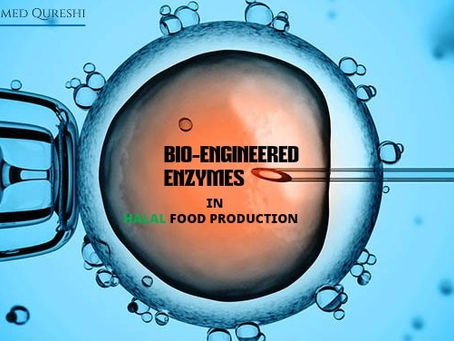Enzymes play a vital function in the regulation and performance of living cells. They speed up reactions and catalyze specific reactions while producing few by products. The food industry has taken advantage of these properties to produce enzymes that can reduce food production costs, manufacturing time, and waste production, and improve taste, color, and texture. The advent of bio engineering has enabled the enzyme industry to produce microbial enzymes that look and function like animal or vegetable enzymes. Bio engineered enzymes are cheaper to produce and easier to control for purity. The use of microbial enzymes is more compatible with Halal food production because it eliminates the use of animal derived enzymes. However, animal-derived enzymes are still used in the food industry, particularly in the dairy industry.
Enzymes have been used for many centuries. There is evidence of the use of enzymes in cheese making as mentioned in Greek epic poems dating back to 800 B.C. Today, enzymes are used for many purposes and in many industries. Major food industry uses are cheese making, baking, fruit and vegetable processing, and food ingredient production. Enzymes are used in production of sugar, processing of starch, hydrolysis of proteins, and modification of oil and fat. Other food uses include brewing and wine making. The first major food industry use of enzymes began in the 1960s, when the enzyme glucoamylase was developed to allow starches to break down to glucose. Until then, glucose production involved acid hydrolysis of starch. While the acid hydrolysis method produces the desired product, use of the enzymatic process reduces production costs, waste, and undesirable by-products. Today, almost all glucose is produced by using enzymes. High-fructose corn syrup, which is found in most soft drinks, is also produced by using an enzyme. In the baking industry, enzymes help improve the quality, freshness, and shelf life of breads and baked goods. They convert sugars to alcohol and carbon dioxide, causing the dough to rise; strengthen the gluten network, resulting in greater flexibility and machinability; and modify triglycerides, resulting in larger loaf volumes.
In cheese making, enzymes help the milk to coagulate, the first step in making cheese. In the dairy industry, both microbial and animal enzymes are used. Enzymes are also used to accelerate cheese ripening and to reduce the allergic properties of dairy products. Chymosin is the enzyme used for coagulation, lipase is used for ripening, and lactase is used to improve digestibility. The source of animal enzymes is a concern for Halal consumers. Cheese and whey produced by using animal enzymes are “Haram if the source is Haram animals”. Cheese and whey produced by animal enzymes from halal animals not slaughtered according to Islamic requirements are doubtful, because only some consumers accept these products. Because whey is found in many nondairy products, the use of animal-derived enzymes to produce whey poses a problem for the Halal consumer. Protein hydrolysis is another application for enzymes. Animal and vegetable proteins are hydrolyzed by using enzymes to improve functionality and nutritional values of proteins. Proteins are used in foods as emulsifiers; hydration agents; to control viscosity; as gelling agents; and to improve cohesion, texture, and solubility.
Production of these proteins by chemical reactions is undesirable because it requires severe conditions and produces many by-products, which are difficult or expensive to remove. Enzymes are faster, allow production under milder conditions, and produce fewer by-products. Enzymes can be tailored to catalyze a specific reaction, with very low by-product formation. Enzymes can be used to produce meat extracts from scrap-bone residues. These are used in soups, sauces, broths, and other applications.
In the juice industry, enzymes increase yields and improve color and aroma. Enzymes are used to clarify juices and extract essential oils from citrus peels. Enzymes can also improve the texture of fruit pieces used in food products, such as fruit-flavored yogurt.
Enzymes can be used in the extraction of vegetable oil. Conventionally, oily materials such as rape seeds, coconuts, sunflower seeds, palm kernels, and olives are first pressed to extract the oil. Remaining oil is then extracted by using an organic solvent. In this second phase, enzymes can be used to allow the oil to be extracted into a water solution, avoiding the need for an organic solvent, making it a more environmentally friendly method of producing oils. However, this method is not yet in wide use. Enzymes are also used to modify oils to improve nutritional value or to produce lubricants and cosmetic ingredients.




